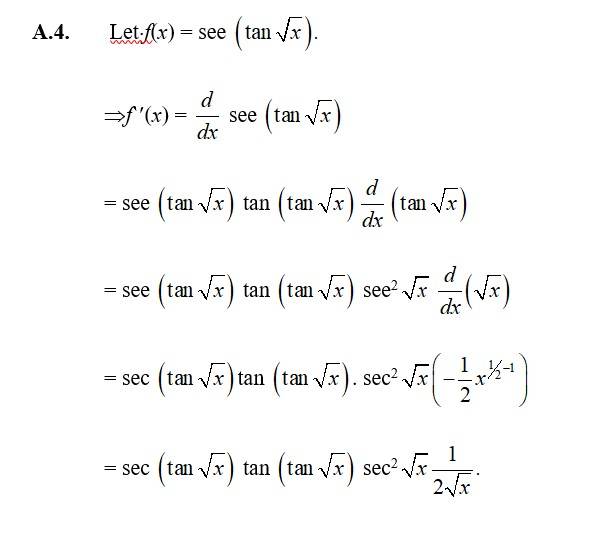Continuity and Differentiability
Get insights from 80 questions on Continuity and Differentiability, answered by students, alumni, and experts. You may also ask and answer any question you like about Continuity and Differentiability
Follow Ask QuestionQuestions
Discussions
Active Users
Followers
New answer posted
7 months agoContributor-Level 10
29. Given, f(x) =
For continuity at x = 2,
5 = 2a + b (i)
For continuous at x = 10,
10a + b = 21 (2).
So, e q (2) 5 e q (1) we get,
10a + b 5 (2a + b) = 21 5 5.
10a + b 10a 5b = 21 25.
4b = 4
b = 1.
And putting b = 1 in e q (1),
2a = 5 b = 5 1 = 4
Hence, a = 2 and b = 1.
New answer posted
7 months agoContributor-Level 10
28. Given, f (x)
For continuity at x = 5,
f (5) = 5k + 1
So,
i e, 5k + 1 = 10
5k = 10 1
k =
New answer posted
7 months agoContributor-Level 10
26. Given f (x) =
For continuous at x = 2,
f (2) = k (2)2 = 4x.
L.H.L. =
R.H.L. =
Then, L.H.L = R.H.L. = f (2)
i e, 4x = 3
New answer posted
7 months agoContributor-Level 10
25. Given, f(x) =
For continuity at
Take .
Putting x = such that as
So
i e,
k = 6
Similarly from
So,
k = 6
New answer posted
7 months agoContributor-Level 10
24. Given, f(x) =
For x = c 0,
f(c) = sin c cos c.
f (x) = (sin x cos x) = sin c cos c = f(c)
So, f is continuous at
For x = 0,
f(0) = 1
f (x) = (sin x cos x) = sin 0 cos 0 = 0 1 = 1
∴ f(x) = f (x) = f (0)
So, f is continuous at x = 0.
Find the values of so that the function is continuous at the indicated point in Exercises 26 to 29.
New answer posted
7 months agoContributor-Level 10
23. Given f (x) =
For x = c 0,
f (c) =
So, f is continuous for
For x = 0,
f (0) = 0
As we have sin
f (x) = 02 a where
= 0 = f (0).
∴ f is also continuous at x = 0.
New answer posted
7 months agoContributor-Level 10
22. Given f(x) =
For x = c < 0,
f(c) =
f(x) =
So, f is continuous for x < 0
For x = c > 0
f(c) = c + 1
f(x) = x + 1 = c + 1 = f(c)
So, f is continuous for x > 0.
For x = 0.
L.H.L. =
R.H.S. =
And f(0) = 0 + 1 = 1
L.H.L = R.H.L. = f(0)
So, f is continuous at x = 1.
Hence, discontinuous point of x does not exit.
New answer posted
7 months agoContributor-Level 10
21. For two continuous fxn f(x) and g(x),
are also continuous
Let f(x) = sin x is defined x R.
Let C E R such that x = c + h. so, as x c, h 0
now, f(c) = sin c.
f(i) = sin x = sin (c + h).
= (sin c cos h + cos c sin h)
= sin c cos 0 + cos c sin 0
= sin c 1 + 0
= sin c
= f(c)
So, f is continuous.
Then, is also continuous
is also continuous
cosec x is also continuous
Let g(x) = cos x is defined x R.
Then, g(c) = cos c
g(x) = . cos x
= cos (c + h).
= (cos c cos h sin c sin h.)
= cos c cos h sin c sin h
= cos c.
= g(c)
So, g is continuous
Then,&nb
New answer posted
7 months agoContributor-Level 10
20. (a) Given f(x) = sin x + cos x
(b). Given, f(x) = sin x cos x
(c). Given, f(x) = sin x .cos x.
Let g(x) = sin x and h(x) = cos x.
If g or h are continuous f x then
g + h
g h
g h are also continuous.
As g(x) = sin x is defined for all real number x.
Let , and putting x = c + h. we see that as
Then g(c) = sin c
g(x) = sin x = sin (c + h).
= (sin c cos h + cos c sin h )
= sin c. cos 0 + cos c. sin 0
= sin c 1 + 0
= sin c
= g (c)
So, g is continuous x R.
And h (c) = cos c
= g(x) = sin x = cos (c + h)
= cos c .cos 0 sin c. sin 0
= cos c .1 0.
= cos c = h(c).
As g and h ar
Taking an Exam? Selecting a College?
Get authentic answers from experts, students and alumni that you won't find anywhere else
Sign Up on ShikshaOn Shiksha, get access to
- 66k Colleges
- 1.2k Exams
- 681k Reviews
- 1800k Answers



